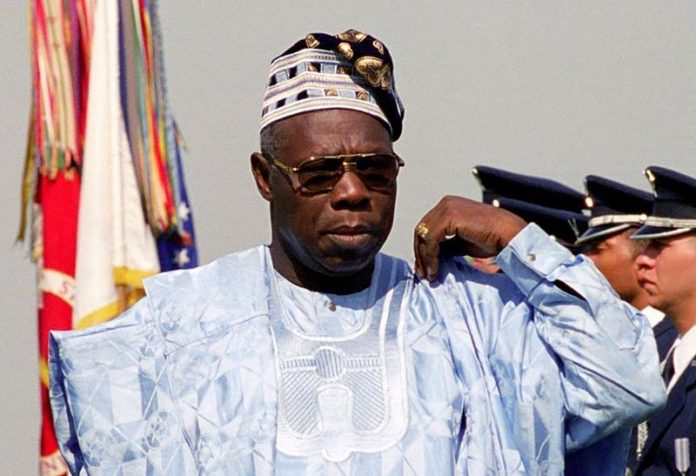Ahead of Gambia’s 4th December 2021 presidential election, the Commonwealth recently constituted an election observers mission to observe and monitor the said presidential election in which six Gambians: incumbent President Adama Barrow, Ousainou Darboe, Halifa Sallah, Mama Kandeh, Abdoulie Jammeh and independent candidate Essa Faal are contesting for the country’s highest office.
The head of the mission is former Nigerian President Olusegun Obasanjo. But who is he?
Chief Olusegun Matthew Okikiola Aremu Obasanjo was born in Nigeria on 5th March 1937. He is a retired political and military leader who served as Nigeria’s head of state from 1976 to 1979 and later as its president from 1999 to 2007.
He was a member of the Peoples Democratic Party (PDP) from 1999 to 2015, and from 2018 has been a member of the African Democratic Congress party. He was born in the village of Ibogun-Olaogun to a farming family of the Owu branch of the Yoruba.
Obasanjo was educated largely in Abeokuta. Joining the Nigerian Army, where he specialised in engineering, he spent time assigned in the Congo, Britain, and India, rising to the rank of major. In the latter part of the 1960s, he played a senior role in combating Biafran separatists during the Nigerian Civil War, accepting their surrender in 1970. In 1975, a military coup established a junta.
After the junta leader Murtala Muhammed was assassinated, the following year, the Supreme Military Council appointed Obasanjo as head of state. Continuing Murtala’s policies, Obasanjo oversaw budgetary cut-backs and an expansion in access to free school education.
Increasingly aligning Nigeria with the United States, he also emphasised support for groups opposing white minority rule in southern Africa. Committed to restoring democracy, Obasanjo oversaw the 1979 election, after which he handed over control of Nigeria to the newly elected civilian president, Shehu Shagari.
He then retired to Ota, Ogun, where he became a farmer, published four books, and took part in international initiatives to end various African conflicts.
In 1993, Sani Abacha seized power in a military coup. Openly critical of Abacha’s administration, in 1995 Obasanjo was arrested and convicted of being part of a planned coup, despite protesting his innocence. While imprisoned, he became a born again Christian, with providentialism strongly influencing his subsequent worldview.
He was released following Abacha’s death in 1998. Entering electoral politics, Obasanjo became the PDP candidate for the 1999 presidential election, which he won comfortably. As president, he de-politicised the military and both expanded the police and mobilised the army to combat widespread ethnic, religious, and secessionist violence. He withdrew Nigeria’s military from Sierra Leone and privatised various public enterprises to limit his country’s spiralling debt. He was re-elected in the 2003 election. Influenced by Pan-Africanist ideas, he was a keen supporter of the formation of the African Union and served as its chair from 2004 to 2006.
In retirement, he earned a PhD in theology from the National Open University of Nigeria.
Obasanjo has been described as one of the great figures of the second generation of post-colonial African leaders. He received praises both for overseeing Nigeria’s transition to representative democracy in the 1970s and for his Pan-African efforts to encourage cooperation across the continent. Critics maintain that he was guilty of corruption, that his administrations oversaw human rights abuses, and that as President he became too interested in consolidating and maintaining his personal power.
Obasanjo has written many books including but not limited to: My Watch Volume 1: Early Life and Military, My Watch Volume 2: Political and Public Affairs, My Watch Volume 3: Now and Then, My Command, Nzeogwu, The Animal Called Man, A New Dawn, The Thabo Mbeki I know, Africa Through the Eyes of A Patriot, Making Africa Work: A handbook, Forging a Compact in U.S. African Relations: The Fifth David M. Abshire Endowed Lecture, 15 December 1987, Africa in Perspective, Letters to Change the World: From Pankhurst to Orwell, Not my Will, Democracy Works: Re-Wiring Politics to Africa’s Advantage, My Watch, Challenges of Leadership in Africa, War Wounds: Development Costs of Conflict in Southern Sudan, Guides to Effective Prayer, The Challenges of Agricultural Production and Food Security in Africa,
Addressing Africa’s Youth Employment and food security Crisis: The Role of African Agriculture in Job Creation, Dust Suspended: A memoir of Colonial, Overseas and Diplomatic Service Life 1953 to 1986, L’Afrique en Marche: un manuel pour la reussite économique, Africa’s Critical Choices: A Call for a Pan-African Roadmap.
He is expected to use his experience to adequately and effectively monitor said presidential election on behalf of the Commonwealth of Nations.




